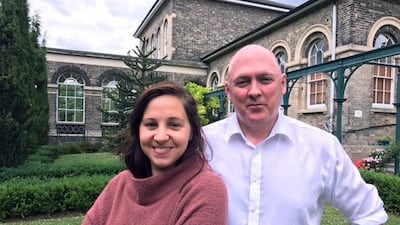When Reem Makhoul wanted to read Arabic stories to her daughter, she wished they were in colloquial Arabic, the language she heard and spoke every day at home.
Ms Makhoul is not against standard Arabic but says it is too formal for children, like her 6-year-old daughter, Sheherazade, growing up in the diaspora.
It is already a challenge for parents to pass on the language to the next generation if they do not live in an Arab country, and equally hard for children to relate to and understand standard Arabic.
So Ms Makhoul, a Palestinian journalist who grew up in Galilee, and her husband Stephen Farrell, a journalist who was born and raised in London, decided to write their own stories in colloquial Arabic. In 2015, they set up their own publishing house, Ossass-Stories, in New York.
Ms Makhoul wanted her daughter — who was born in Jerusalem, moved to New York with her parents as a baby and now lives in London — to stay connected to Arabic, especially because she was surrounded by English at school and among her friends.
“I read Arabic books to her every day, but as a parent I found it as frustrating to read these fussha [standard Arabic] books as I had found it reading them myself as a child,” she said. “My daughter didn’t relate to the formal language, and I found it exhausting — at the end of a long day as a working mother — to read them out in amiyyeh [colloquial], translating them in my head from fussha.
“I needed to do something about it: that night the idea of writing our own children’s books in amiyyeh was born. It was March 2014. A year and a half later, we published our first book.”
Inspired by their daughter, whom Ms Makhoul describes as funny and clever, the couple wrote The Girl Who Lost Her Imagination, which would become the first in a series of books to help children appreciate their language and culture.
It was about a young Arab girl, Sheherazade, who was living in New York City and loved to explore the world. One day, the protagonist wakes up and realises that she had lost her imagination. However, her passion to explore takes her to the streets around her home in the city and provide endless material to reactivate her imagination. She learns about rainbows and colours.
The book was published in Egyptian and Shami (Levantine) dialects, spoken in Palestine, Jordan, Lebanon and Syria.
This month, the couple published their second book called Where Shall I Hide?.
Sheherazade is a bit older, more independent and goes out into the big city and then has to deal with the unexpected departure of some dear friends. On one level, the story is about a journey dealing with change, which is hard for all children. On another, it is to teach children about shapes.
Despite Ms Makhoul’s enthusiasm to get children interested in Arabic, language experts are concerned that standard Arabic — the sixth official language of the UN since 1973 — is at risk.
Experts argue that this is in part due to the use of colloquial Arabic on social media as well as the methods used in teaching the language in different Arab countries.
Meanwhile, Arabs have been emigrating to the US in significant numbers since the late 19th century.
According to the Arab American Institute, a non-profit organisation, nearly 3.7 million Americans trace their roots to Arab countries, including Syria, Lebanon, Egypt, Palestine, Iraq, Jordan and Yemen.
In Latin America, there are up to 30 million people of Arab descent — by far the highest number of Arabs outside the Middle East.
"I respect colloquial Arabic, but only for speaking and listening skills. I encourage my students to learn it," said Basma Dajani, an associate professor of Arabic at the University of Jordan. "But writing colloquial poses a threat for the unity of the language. Arabic is one language, it is like a tree with many branches and colloquial is one branch.
“There are different dialects and, if we use colloquial in writing, we will not understand each other."
For Ms Makhoul, the idea behind using colloquial Arabic in children’s books was to encourage them to read for fun.
“I think fussha is very important. But I equally believe that there's a place for amiyyeh in books,” she said. “It's our everyday language, the language of our life, and it should have a place in our literature.
“I believe that if we create fun and good books in amiyyeh, it will only help children later on in their transition to learning fussha.”

